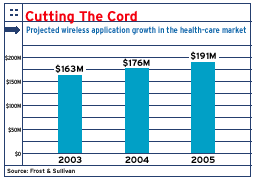FDA's Medication Bar-Code Proposal Raises Awareness
The FDA this month opened for comment a proposed rule to require drug labeling based on a standardized database of medication information after months of meetings with patient safety advocates, health-care providers and pharmaceutical manufacturers.
FDA officials will hold a 90-day period for comments on the rule and expect to release a finalized version by the end of the year. The bar-code requirement will take effect three years after the agency publishes a final rule.
Solution providers said the latest discussions about medication labeling with a corresponding database are increasing awareness for IT systems,including wireless systems,that help prevent medication errors.
"This is going to significantly stimulate interest in the products," said Mike Wisz, vice president of product management at Bridge Medical, a Solana Beach, Calif.-based solution provider that specializes in bar-code medication systems. "Three years ago, we had a tougher sale convincing hospitals that medication errors need to be addressed."

Bridge Medical's MedPoint MedAdmin, like other bar-code-based medication solutions on the market, enables a nurse to scan a patient wristband or ID and the medication that is to be dispensed. That data is then sent to a hospital database that ensures the right medication in the right dose is being given to the right patient.
Avoiding medication errors is at the top of health-care providers' IT priorities, according to a recent study released by the Health Information Management Systems Society, eclipsing even HIPAA-related concerns.
Only about 50 percent of drug companies currently offer bar-code labeling on their medications, forcing hospitals that are trying to better manage drug distribution to hand-label and repackage medication in-house, Wisz said.
"In the past, everyone has used a proprietary bar-code system," said Jeff Schou, director of worldwide health-care markets at Symbol Technologies, Holtsville, N.Y. "The FDA will standardize bar codes so no matter who [health-care providers] buy from, they can use a standardized database to tell what kind of medication it is."
The FDA expects health-care providers will spend $7.2 billion to acquire new bar-code systems, but at the same time, by avoiding medication errors, they will save at least $41.4 billion from reduced related hospital stays and patient pain and suffering.